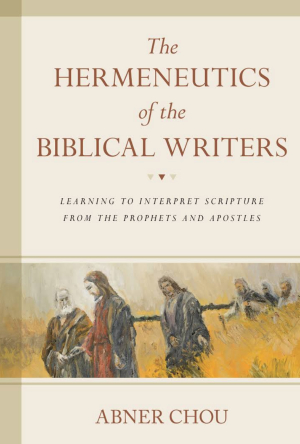The Hermeneutics of the Biblical Writers
Abner Chou's scholarly work on the methodology of the biblical writers themselves is to be welcomed, but is more successful with the apostles than the prophets
 The Hermeneutics of the Biblical Writers - Learning to Interpret Scripture from the Prophets and Apostles
The Hermeneutics of the Biblical Writers - Learning to Interpret Scripture from the Prophets and Apostles
By Abner Chou
Kregel Academic/Alban Books
ISBN:
Reviewed by: Alec Gilmore
Over the years the Bible has been read and interpreted in many ways, from the Early Church Fathers to Medieval Times, from the Reformation to contemporary scholarship (always worth remembering when biblical literalists get on their high horse or enlightened modernists think they have got it right), but when Chou realised how little work had been done on the methodology of the biblical writers themselves (especially in the New Testament) he set to work to fill the gap.
As it turns out he is more successful with the apostles than the prophets who he seems to think had 'the Bible' on their desk as they wrote, with questionable anachronisms, such as Isaiah using Deuteronomy or Daniel using Jeremiah, often carefully choosing their words for the benefit of later writers.
Chou is fairly restrained in his conclusions. He is not saying this is the only acceptable methodology or that it is appropriate for every situation, but can be a useful touchstone when flights of fancy take over or imagination gets out of control, which is a salutory check in a time when reader response and a wide variety of 'readings' (feminist, racist, colonialist) are on the rise. Crucial to his argument for example, is an understanding of the original writer's intent; we may not stay with it but need to be aware if we are deviating from it.
The intention is sound and a scholarly work on this subject to be welcomed, provided we remember that it is 'scholarly' on a fairly narrow scholarly base and of limited value for those who prefer a more liberal approach.
Less discerning users should also be aware that it is simply one more hermeneutic, a theory or reconstructon with minimum evidence that it ever was just like this and we can't go back to the prophets to ask them.
The work is very detailed and many readers will find it heavy going, but there is one simple light not to be missed. When teaching children in Sunday School Chou identified three types of student. One always followed instructions and finished up in the right place by meticulously joining up all the dots. Result? An excellent picture of Abraham sacrificing Isaac.
A second skipped a few dots or didn't follow the specified order. Result: Abraham had a hand missing.
A third devised their own way of connecting the dots and made a picture to their own liking. Result: an aeroplane.
Very important to make sure we have all the dots and in the right order (says Chou), but equally important perhaps to allow for imagination and a touch of originality provided the picture conveys the truth of the original intention, something very close or defensible on strong grounds. An index would have been an asset.
Alec Gilmore is a Baptist minister
Baptist Times, 17/08/2018